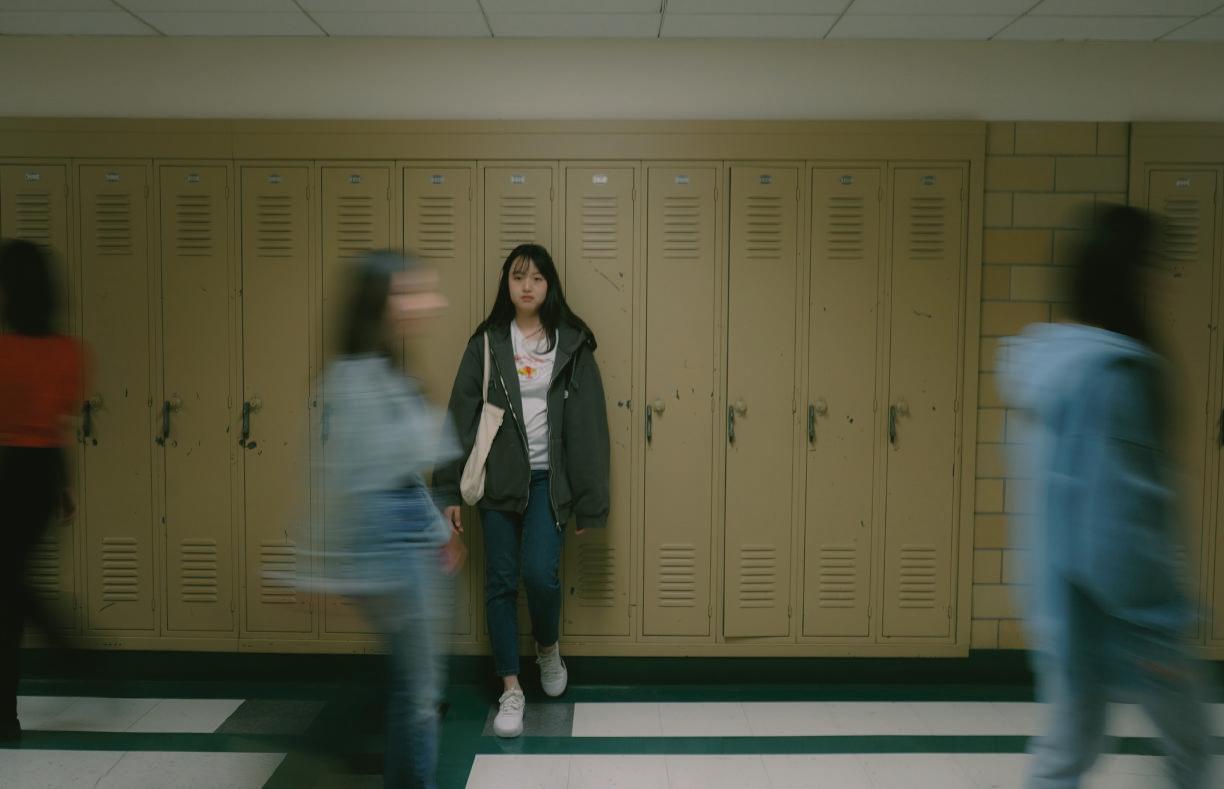
7 minute read
WHILE WE’RE YOUNG
from nuAZN | #29. COMING OF AGE
by nuAZN
Coming of age evokes a sense of nostalgia, capturing the transition into adulthood through a series of eye-opening experiences that shape us into who we are today. They capture the beauty and simplicity of youth that we can never truly relive. Inspired by iconic coming-of-age movie scenes from films like The Breakfast Club or The Perks of Being a Wallflower, the photoset aims to give Asian Americans — who have been traditionally ignored and sidelined in these narratives — their own coming-of-age moment.

Advertisement




Moving over 2,000 miles to college put me in a “long-distance relationship” with my parents. Typical laws of social interaction make it clear why distance is usually terrible in any relationship: People often find it harder to connect and maintain the same intimacy when physically separated. By that logic, it’s strange I feel closest to my parents when we’re the farthest apart we’ve ever been.
The authoritarian Asian parent
At home, my dad used to block me and my sister’s internet access to Netflix and YouTube, both of which he declared “làngfèi shíjiān!” — wastes of time, in Mandarin. We now (sarcastically) refer to that era as “Life Behind the Great Firewall.”
My parents definitely fit the stereotype of the strict, immigrant Asian parent — hyperfocused on my good grades and keeping my social life to a minimum. The restrictive lifestyle my parents enforced was common among my second-generation Asian American friends’ parents growing up.
From an academic point of view, my dad’s perspective lines up with authoritarian parenting, defined by “lower levels of warmth, psychological autonomy, alongside strong behavioral expectations.” This perspective is typically associated with Asian parenting, according to research from the Eastern Sociological Society.
In contrast, Alissa Levy Chung, NU associate professor of instruction in psychology, says authoritative parenting centers around warmth, sensitivity, moderate control and “teaching-based discipline.” Mainly researched in Western countries, it is considered the “gold standard” of parenting in Western research communities, Levy Chung explains.
However, many parenting researchers come from Western backgrounds, Levy Chung says, and don’t understand the nuances in some Asian parenting styles and cultural values. Additionally, research at the James Madison University psychology department reveals attachment theory studies have predominantly focused on Western populations, which is why conclusions on the relevance of the authoritative/authoritarian binary to Asian parenting is unclear. Consequently, Asian parents are disproportionately portrayed by researchers as “less warm” for not expressing affection in outwardly emotional or explicit ways that Western parents often do.
When I was younger, I would have considered my parents extremely authoritarian. Along with blocking streaming services, my dad set Screen Time restrictions on my phone and laptop to shut down all my apps after 11 p.m. If my sister and I came home even a few minutes past 10 p.m., my mom would refuse to unlock the front door for at least an hour.
It took leaving home and reflecting on my upbringing for me to understand how my parents’ “warmth” was, and is, present in my life.
管 (guan) is a Chinese parenting philosophy that is central to childrearing, according to psychologist Ruth K. Chao. Under guan, parents govern their children through firm control to guide them to success. Chao explains the difference between authoritarianism and guan in this way: The former is motivated by hostility, whereas the latter shows love and concern.
Not only do I now believe my parents’ restrictions were fair, but guan explains that their controlling nature was actually their articulation of “warmth.”
A delayed understanding of unspoken love
In December of my high school senior year, I remember shivering in the back of my friend Jai’s car hours before opening my first college decision. I told my parents I needed to be alone, terrified of their disappointment and anger that would follow immediately after reading the words “We’re so sorry” at the beginning of the letter.
My dad sent me a surprisingly accepting text: “Jade, don’t be stressed. It is OK whatever the result is.” I froze reading his second message, sent a minute later: “Also remember, whatever the result is, we love you.”
I could not remember the last time he told me any variation of “I love you.”
Growing up, my Asian friends and I decided that our parents’ lack of verbal affection was because they felt inherently detached from us.
Some Asian NU students also doubted their parents’ love for them growing up.
After her twin sister left for boarding school in freshman year of high school, Medill second-year Anita Li felt like her mother was “watching like a hawk” at home in Maryland. She says the constant attention led to frequent instances of tension between her and her mother.
Levy Chung says Eurocentric research assumes the idea that love and warmth comes in the form of smiles, hugs and other visible signs of intimacy.
“At some point, neither of us thought we loved each other,” Li says.
For some Asian parents, actions speak louder than words and physical affection. But in the moment, the messages they communicate aren’t always clear to their children. Sometimes, Asian parents can go too far with their criticism. At other times, comments they make are completely illogical and unjustifiable.
During high school, Li’s mother drove her for almost an hour to and from school in Washington, D.C., daily, a privilege Li is deeply grateful for in hindsight.
“Did I appreciate her enough while she was doing it? No, because she was so fucking mean to me all the time,” Li says, recalling her mother lecturing her about tests or calling her “fat” during the drives.
Li says she realizes now that the Asian “spirit of sacrifice” that her mother embodies doesn’t translate well into love by American standards.
During Winter Quarter, Li was offered a summer internship in Wisconsin that required her to find her own transportation to and from work every day. Li, who did not have a driver’s license, called her mom explaining the problem.
Li’s mother didn’t hesitate in offering to make the trek to Evanston to help her practice for the driving test. She even said she would drive Li to and from her internship over the summer if she could not get her license.
“She literally offered to drive all the way from Maryland, just so that I can have an internship in a career that she doesn’t even want for me,” Li says.
For Medill third-year Ryan Choe, his Korean immigrant parents worked hard to see him succeed. But it wasn’t until he set foot on campus for the first time without them that he understood his parents’ sacrifices.
“My parents busted their butts just to give me this,” Choe says.
He says he rarely questioned his parents’ rules as a kid, but after reflecting on his relationship with them during COVID-19 and his freshman year, Choe and his parents finally began having conversations about their upbringing and how their struggles shaped their valuation of higher education.
“There are very few things that Asian immigrant parents would not do for their kids,” Choe says. “Even though we can’t see the intent behind that, I can confidently say it comes from a place of absolute love.”
Distance makes the heart grow fonder
For the children of first-generation Asian parents, distance can indeed be more healing than destructive.
McCormick fourth-year Nicholas Tsung says he was excited to come to NU after a tense senior year filled with fights with his mother over college applications.
COVID-19 solidified Tsung’s perspective that distance, not just aging, improved his relationship with his mom. When he stayed home from freshman to sophomore spring of college due to the pandemic, Tsung says the same stressful dynamics of high school resumed because there was no way to leave the house.
“Now that I’ve had the chance to live apart from them, I can appreciate the time we have together more,” he says.
My experiences returning home as a college student paralleled Tsung’s. I was so ready to see my parents at the beginning of
Winter Break, but by the end of it, we had repeated every high school-era argument at least once. On the early morning drive to the airport, my dad launched into a long lecture summarizing the clashes we had over break.
“Yǐhòu, nǐ zuì hǎo bié huí jiā,” he said conclusively as we pulled up to my terminal. Next time, you better just not come home.
Thirty minutes later, he texted, “Have a safe flight, Jade!” to our family group chat. I hadn’t even left the state yet, but we had already returned to a ceasefire. I was equally drained and relieved to come back to school.
Especially during the first year of college, it is “developmentally appropriate” for students to need separation from their parents, Levy Chung says.
For Tsung, the distance pushed him to bring up difficult, confrontational topics with his mom. During his freshman year at NU, Tsung struggled to adjust the study habits he had formed in high school to a college environment. He tried to seek comfort from his mom, who wasn’t initially receptive to listening.
Realizing she was “the only one” he could talk to about his stress at the time, Tsung decided to have a serious conversation about empathy with his mom.
“She started to understand that I don’t need her to lecture me,” he says. “I just need her to be there for me.”
As Tsung gets ready for graduation, the future of his relationship with his mother is uncertain. Tsung has a job lined up in Seattle, while his mother will be moving between California and Florida.
Tsung says he would like to see his mother more, but he’s “on the fence” about living together, remembering high school and the pandemic years of college.
“Even though things feel different now, I don’t know if they truly are different,” Tsung says.
I wonder how I’ll feel when I, too, am an upperclassman, contemplating graduation and where to start my real adult life.
My dad will always welcome me home, but perhaps there is some underlying truth to what he said out of frustration on that early morning drive to the airport.
Maybe during some college breaks, I shouldn’t go home. As I grow more confident in my independence, it may be permanently necessary for me to maintain the distance between my parents and me. It doesn’t have to be 2,000 miles, but I know we’ll need to be a little bit apart to love each other the most. That’s the irony — to come together and appreciate our time, we need to be separate.








